- Home
- Susan Fleet
DIVA
DIVA Read online
Praise for Susan Fleet’s Frank Renzi novels
Absolution Best Mystery-Suspense-Thriller, 2009 Premier Book Awards
“Relentless tempo and sharp writing.” -- Kirkus Discoveries
“Creole-flavored suspense, colored with musical connections which Fleet handles with particular deftness.” -- Attleboro Sun Chronicle
“Fleet has created a crime drama that stands far above the ordinary whodunit. A wholehearted bravo!” -- Florida Times-Union
"First class writing! Fleet goes inside the head of the killer with a rare talent. An 'I couldn't put it down' thriller." -- C. J. Gregory
Diva
“Great character development [and] an absolutely fascinating ending ... a very suspenseful book!” -- Feathered Quill Book Reviews
“Fleet subtitles Diva, her new killer thriller, a novel of psychological suspense. That's an understatement.” -- Jan Herman, Arts Journal
“Frank Renzi returns in a relentless hunt through ravaged, drug infested neighborhoods in search of murderous thugs and a psychotic stalker. Fleet weaves another nail-biting page-turner!” -- K. G. Hunt
“Fleet takes us inside the head of the obsessed stalker as he lusts after his victim ... a must-buy book.” -- Tom Bryson, author of Too Smart To Die
Natalie’s Revenge Best Mystery –2014 Feathered Quill Book Awards
“The coolest detective in literature at the moment, Frank Renzi, [has] a new crime to solve. Natalie is a truly intelligent and seductive character. This is one great author!” – Amy Lignor, Feathered Quill Book Reviews
“... an amazingly great read, fast paced, well written and extremely challenging to put down.” -- Rebeccas Reads
DIVA
A novel of psychological suspense
“It is not the idol but the worshippers that are to be dreaded.”
-- William Hazlitt
SUSAN FLEET
Music and Mayhem Press
Dedication
To stalking victims everywhere, and especially to A.M., a friend and fellow brass player, who finally escaped the man who stalked her.
CHAPTER 1
Thursday, 12 October 2006
With military precision, he thrust his torso upward, arms rigid, palms pressed to the floor. Oblivious to the dingy carpet that reeked of cigarette smoke from the previous tenant, he feasted on the slick color brochure that lay below him. Belinda Scully, celebrated soloist on the cusp of stardom.
Gazing up at him. Enticing him with her come-hither smile.
Admiring his naked hard-body.
Audiences loved her fiery passion, her magical way with the flute.
He loved her, too. Desire flamed his groin. He lowered his body and brushed her photograph with a kiss. He wanted to lick every inch of her, wanted to make her moan with ecstasy and make her beg him for more.
A final burst and his pushups were done. He sprang to his feet, bathed in sweat. Even in October the New Orleans humidity was a killer. He’d shut off the air conditioner. Paying for this shitty studio apartment was bad enough; he didn’t need sky-high electric bills to boot. His money paid for more important things: air fares and hotel rooms and concert tickets.
He toweled sweat from his face and sank onto his cheap metal futon. Large posters on the opposite wall hid cracked plaster and chipped paint: Belinda at Tanglewood, Belinda at the Hollywood Bowl, Belinda in St. Louis. The first two he had obtained after the concerts, asking nicely. The third he’d stolen from a glass display in a quick smash and grab.
The photos didn’t do her justice. She was far more beautiful in person.
The insistent throb in his groin became a full-fledged erection.
“Dazzling technique and a sensuous dulcet tone,” the Times-Picayune reviewer had gushed. A rave review—justly deserved—of her performance with the Louisiana Philharmonic last weekend.
From his fourth row seat he had watched his beloved pour her emotion into the music. Thirteen years of heartache. He knew what that was like.
At the after-party, he’d watched the LPO benefactors fawn over her, rich old men lusting after his beloved, seduced by her captivating smile, sapphire-blue eyes and the coppery hair cascading in waves to her shoulders. Watched them and hated them. Lurking behind her, aching to touch her, he had edged closer, close enough to smell her favorite perfume, Mambo.
He flexed his fingers. It had been ages since he’d touched a piano. Years since he’d talked to his beloved. She hadn’t responded to any of his messages.
How dare she ignore him? A sea of burning acid roiled his gut.
Tonight he would send her a different message.
______
“Damn it to hell!” Frank Renzi stared at his computer screen: Ink Cartridge Empty. Two hours writing reports, the last thing he needed was a dead printer. He wanted to go home. Not that anyone was waiting for him, but he could have a beer and chill out with a Clark Terry CD.
He strode to a metal supply cabinet, opened it and cursed again. No print cartridges. SOS, fourteen months post-Katrina, half the residents still gone, violent crime off the chart and NOPD short 400 officers, not to mention money for equipment. The thugs were winning.
The sweet scent of jasmine wafted through the window bringing sounds of the night: the rumble of a delivery truck, the honk of a taxi, the clangor of Bourbon Street one block away, bars and strip joints bursting with workers who’d come to New Orleans to rebuild the city.
He returned to his gunmetal-gray desk, one of four jammed together in the center of the Eighth District homicide office. They were short a detective, and stacks of unsolved case files stood atop one desk. He cancelled the print run and yawned. It had been a backbreaking day, starting with a homicide at Iberville, a public housing complex north of the French Quarter plagued by gangbangers and drug dealers. When he and his partner arrived, a crowd encircled the victim, a young black male with two GSWs to the head, the body count climbing in an eruption of drug-related hits. A second teen had taken slugs in his legs. No wits, of course. Nobody knew nothin'.
Any kind of luck, the second kid would live to see another day.
Any day without a murder was a good day in New Orleans.
His internal phone line buzzed: the desk officer calling.
“Sorry, Frank,” said Bill Poche. “I hate to bother you this late.”
During his four years with NOPD, Franklin Sullivan Renzi had acquired a certain reputation thanks to his ruthless pursuit of thugs, and his expletive-laden tirade at the Deputy Chief one day when the fool tried to tell him how to do his job. “What’s up, Bill?”
Please, not another homicide. He was ready for a beer, not another corpse.
“I got a young couple here want to report a possible murder attempt.”
He heard a male voice in the background: “. . . tried to kill her.”
“Yes, sir,” Poche said, “you can tell Detective Renzi all about it.” To Frank, he said, “By the way, don’t forget that big bash tomorrow.”
Big bash. NOPD-code for VIPs. Just what he needed, nine-thirty at night. He set an Incident Report form on his desk, went to the door and played Who’s-the-VIP. No shortage of show-biz celebrities in New Orleans: John Goodman, Nick Cage, Brad and Angelina roaming around the Big Easy.
A door at the end of the hall opened and a well-dressed couple, early thirties tops, approached him. The woman was a knockout, five-seven and willowy in her skimpy aqua dress. Great legs, except for the scrape on one knee. Her companion was six feet tall and skinny, his lips a grim line between his dark moustache and beard. Frank didn’t recognize them, made a bet with himself: Whoever speaks first is the VIP.
The woman dazzled him with a smile that lit up the dreary hallway. Raised her chin like an Olympic gymnast, as if to say: Watch me! I am the best.
&nb
sp; “Belinda Scully,” she said.
The name didn’t ring a bell, though she looked vaguely familiar, even features, copper-colored hair skimming her shoulders. Attractive. Amazing eyes. Great bod. Maybe this wouldn’t be so bad after all.
“Jake Ziegler,” said her companion. No smile, a worried frown and a limp handshake.
He led them into the office and gestured at two visitor chairs beside his desk. “Looks like you scraped your knee, Ms. Scully.”
“Please, call me Belinda.” Claiming the chair nearest him, she crossed her legs and arranged her skirt. “I’m fine. This is a big fuss over nothing.”
Ziegler folded his gangly frame onto the other chair, his dark eyes smoldering. No wedding rings, but it seemed clear that Belinda wore the pants in the relationship, whatever it was.
“Tell me what happened,” he said.
“We had dinner at Trattoria Bella,” she said, gazing at him with her startlingly blue eyes. “It’s a great restaurant. Have you been there?”
“Yeah, home-cooked Italian,” he said, and realized she was staring at his chin. Fourteen hours since he’d shaved, the two-inch scar was probably a white zigzag amidst his dark stubble.
Radiating annoyance, Ziegler fidgeted in his chair. He cleared his throat, an ugly rasp, but said nothing. Was he waiting for her permission to speak?
Frank looked at Belinda. “Did the incident happen in the restaurant?”
“No. In the parking lot.”
“We were walking to the car,” Ziegler said, agitated. “I heard a high-pitched whine and screeching tires and this car came out of nowhere—”
“And then the headlights came on—”
“Right, Belinda. And then the bastard tried to run you down!”
Frown lines formed between her eyes. “He wasn’t trying to—”
“Yes, he was! He drove straight at us.” Like a Cocker Spaniel begging for a treat, Ziegler gave him an imploring look. “Detective Renzi, if I hadn’t pushed Belinda aside, the car would have hit her!”
“Jake, it was just some kid—”
“Hold it.” He rubbed his temples to ease a budding headache. Was this a lover’s quarrel? Was Boyfriend working on his Hero merit badge? He fixed Ziegler with a hard stare. “What makes you think it was deliberate?”
Ziegler tugged his beard with long slender fingers. Every nail was bitten to the quick. “Belinda’s a public figure. Don’t you know who she is?”
He spread his hands, a weary disclaimer. “Sorry. You got me there.”
Ms. Celebrity smiled. “Not everyone is a classical music fan, Jake.”
Then he remembered the photo-spread in the Times-Picayune last week. “Oh, right. You’re the flutist that played a solo with the LPO last weekend.”
“Yes. Seven years ago the LPO gave me my first break, a solo performance with a professional orchestra, and I fell in love with the city. Four years ago I moved here from Boston.”
“Me, too,” he said, and wished he hadn’t when he saw the spark of interest in her eyes.
“Why did you move to New Orleans?”
Because my wife divorced me, and a little girl died that shouldn’t have.
“I hate shoveling snow.”
She gazed at him, somber-eyed. Her eyes were stunning, deep pools of emotions he couldn’t decipher, a hint of pain, then nothing.
“I bet it’s more complicated than that.”
The comment surprised him. Had she seen something in his face, some remnant of the anguish he’d felt when he decided to leave Boston? Maybe there was more to Belinda Scully than celebrity-hood. Maybe a real person lurked beneath her carefully groomed exterior: aqua eye shadow, lip-gloss, not a strand of coppery hair out of place.
He started to print her name on the Incident Report.
“Don’t put my name on that,” she said, her voice edged with steel.
“Use mine then,” Ziegler said. “I don’t care. Someone tried to kill her.”
This was getting tedious. “Can you describe the car, Mr. Ziegler?”
“No. It happened too fast. It was dark.”
“The car was dark?”
“Yes,” Ziegler said, his voice rising in exasperation. “Dark and big. A big dark sedan. We were walking along, talking the way you do after a meal, and a car came out of nowhere and homed in on us like a . . . like a missile!”
“Did you get a look at the driver?”
“No. I was too busy looking out for Belinda.” She shot Ziegler a nasty look, but Ziegler ignored it. “Someone tried to kill her.”
For the briefest instant, he saw a flash of fear in her sapphire-blue eyes. Then her carefully crafted mask reappeared. No window to the soul through those baby-blues now. She kept denying Ziegler’s assertion that someone had tried to kill her. Maybe she wasn’t so sure.
“What makes you think someone wants to kill Belinda Scully?”
Ziegler stared at the floor, clearly uncomfortable.
He’s hiding something and so is she. They both have secrets. Hoping to jolly it out of them, he said, “What? You think someone didn’t like her solo?”
Belinda grinned at his flip remark, as though they were conspirators. They weren’t. She wanted to flirt. He wanted to go home.
“There’s more to it than that," Ziegler said. "This is an anniversary of sorts. We have dinner together every Columbus Day, the day her parents—”
“Jake! Stop. Detective Renzi isn’t interested in hearing my life story.”
He felt the beginning of headache build behind his eyes. Then his cell phone chimed, always trouble at this hour.
It was Kenyon Miller. “Frank! Cop down in Lakeview. Where y’at?”
Cop down. His heart hammered his chest like a drummer bashing cymbals. “At the station. Call you back when I’m on the road.”
He opened the bottom drawer of his desk and took out the leather holster that held his SIG-Sauer.
The well-dressed couple beside his desk stared at him, wide-eyed.
“Leave your contact information at the front desk, Mr. Ziegler. I’ll call you tomorrow.”
CHAPTER 2
Tires screeching, Frank barreled into the I-10 exit at sixty miles an hour and swung north on West End Boulevard, the main drag through Lakeview. Before Hurricane Katrina decimated the city in August 2005, Lakeview had been an upscale predominantly white neighborhood. Now it was dark and deserted, no street lights, abandoned homes on both sides of the street. The Katrina floodwaters had reached the eaves of some houses and shoved others off their foundations, scenes reporters likened to war-torn Kosovo, filming a sign on one flood-ravaged home that said: I AM HERE. I HAVE A GUN.
West End ran three miles north to Lake Pontchartrain. Thirty yards to his left Pontchartrain Boulevard ran south. Between them was the neutral ground, shrouded in darkness, cleared now of the fifty-foot mountains of debris dumped there after Katrina. Piercing the inky-black shadows of the two-lane street, his headlights revealed a boulder-sized pothole. He swerved to avoid it, got on his cell phone and called Kenyon Miller.
“I’m on West End headed north. Lay it out for me.”
“Off-duty cop goes in a convenience store to buy cigarettes,” Miller said. “He’s in civvies but carrying, you know, ‘cuz Lakeview’s a ghost town these days. He sees a kid holding a gun on the clerk and a female customer, goes for his piece and the kid shoots him. He makes it outside to his car and calls for backup. I called you soon’s I heard.”
“How’s the cop?”
“They took him to City Hospital, no word yet. What happened, one of the maggots used the woman as a shield. Him and another kid piled into a black Cadillac, probably boosted, and split. The cop didn’t dare shoot with the woman in the car.”
“You got a description on the scumbags?”
“Two black males, late teens, early twenties. Cop only saw one gun, but you never know. Gunslinger’s a wide-body in cargo pants and a hoodie, driver’s a skinny guy with dreads.”
“There�
�s trouble, two black kids take a white woman hostage.”
“No shit. Only black folks came back are the thugs. My wife and kids gotta stay in Atlanta with Tanya’s mother, and I’m bunking in a goddam FEMA trailer ‘cuz our house took seven feet of water and I can’t find a contractor to work on it.”
Miller called his family every night to quiz his son and daughter on their homework, trying to be a good dad, long distance.
“You can bunk with me anytime, Kenyon. I told you that.”
“Thanks for the invite, Frank, but I gotta stay close to my house, you know? Goddam looters.”
The looters came out after dark like roaches, stripping homes of plumbing, light fixtures, copper flashing, anything they could sell.
“How’s the clerk?”
“Shook up but he’s okay. The scumbag told him to stay put, fired a shot to scare him.”
“Okay, I’ll check the side streets over here. Keep in touch.” He turned right onto a street lined with gutted homes and mounds of debris piled at the curb. He rolled down his window and putrid odors filled his nostrils.
An instant flashback to Katrina: the horrible stench of raw sewage and dead bodies afloat in waist-high water, a tragedy so profound that some residents hadn’t recovered. Some never would. The first week fires burned unchecked for lack of water and the manpower to fight them. Frantic parents looted Wal-Mart for diapers and baby formula. The thugs looted pharmacies and stores with guns.
A barking dog drew his attention. He trained the cruiser’s spotlight on a house: gaping windows without glass, a crumpled carport tilted against a fence, no signs of life. Or a dog.
He drifted into the next block, heard faint sirens in the distance. Here there was only silence, unlike the desperate days after Katrina when the sound of helicopters, chainsaws and sirens filled the daylight hours. Nightfall brought inky darkness and a scary silence punctuated by gunfire. No one shaved or bathed for days, pissing in toilets that didn’t flush, living on MRE’s and water. And beer if they could get it.

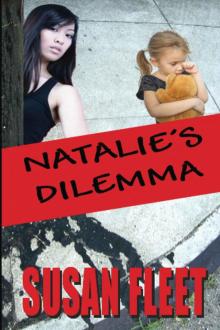 Natalie's Dilemma: a Frank Renzi crime thriller (Frank Renzi novels Book 7)
Natalie's Dilemma: a Frank Renzi crime thriller (Frank Renzi novels Book 7)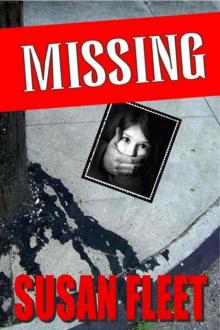 Missing, Frank Renzi Book 6
Missing, Frank Renzi Book 6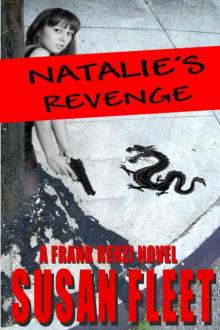 Natalie's Revenge
Natalie's Revenge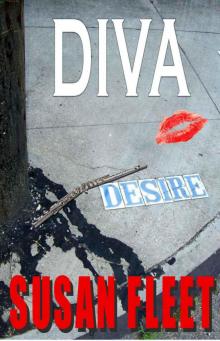 DIVA
DIVA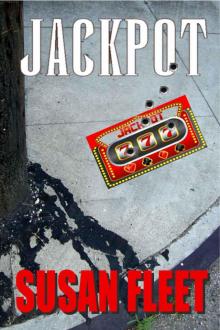 Jackpot (Frank Renzi mystery series)
Jackpot (Frank Renzi mystery series) Natalie's Art: a Frank Renzi novel
Natalie's Art: a Frank Renzi novel